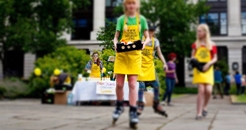 Early enterprise education
Early enterprise education
From a report by Gem Consortium
The UK currently lags behind its European counterparts when it comes to enterprise education during primary and secondary school. It ranks in the 12th place in the Global Entrepreneurship Monitor’s 2018 review of basic school enterprise education, behind countries such as the Netherlands, Latvia, Sweden, Luxembourg, Ireland, Spain and Switzerland.
The consequence of this is that we risk dampening the country’s future economic prosperity.
Here are some programmes tailored to young people in schools, youth groups, etc., that could be used:
Citrus Saturday
Citrus Saturday is an experiential learning programme developed by UCL (University College London) aimed at teaching entrepreneurship and enterprise skills to young people around the world.
Their Citrus Saturday Toolkit equips young people with the skills to start their own business and make a future for themselves. Participants create a lemonade product, brand it and sell it to the public, then keep the profits from their work.
Do you work with young people? They'll provide everything you'll need to give young people the chance to experience business first-hand, increasing their employability, raising their aspirations and broadening their sense of what can be achieved with energy, enthusiasm and determination.
Their Toolkit is available to any organisation that works with young people e.g. a school, college, youth club, volunteer group. Find out more here.
Founders4Schools
Founders4Schools is a charity that connects educators with a network of inspirational business leaders, to improve the employment chances of young people. By joining their online platform, teachers and employers are given the opportunity to come together through meaningful encounters that are backed up by the latest evidence on careers guidance.
Their mission is to prepare students for the rapidly changing world of work - and give all young people a great start in life, no matter their background.
See how you can get involved in improving youth employability here.
Inspiring the Future
Similar to Founders4Schools, Inspiring the Future enables schools to connect with inspirational volunteers from the world of work quickly and easily, revolutionising the way in which young people get insights into exciting and unique careers and inspiring them to be ambitious.
Read more here
The Tenner Challenge
Students are given £10 and have a 4 week Challenge:
-
Students research and decide on a product or service to invest their tenners in
-
Teams need to source materials or products, prepare sales pitches, and plan selling events
-
Students get their product or service ready and promote their selling events
-
At end of the Challenge students decide how to spend or donate their profit after repaying £10 pledge plus £1 legacy contribution
There are Competitions. At the end of week 1 and week 2 students have the opportunity to enter a weekly Challenge competition regarding Logo Design and a 60 second Sales Pitch. There is also a National Tenner Competition which runs at the end of the four week programme. There are five different awards:
-
Most Profitable Business Idea
-
Best Team
-
Most Inspiring Person, within a team or individual budding entrepreneur
-
Tenner for Good
-
Best in Sustainability
Full details are available here.
The Fiver Challenge is the same as the Tenner one but for primary schools.
Let's look at the typical impact of the above education based on one of the above:
-
90% teachers agreed it contributes to the school’s careers programme
-
84% of teachers agreed it supports educational requirements for a broad range of subjects including maths and english
-
80% students agreed it helped them to understand the world of work
-
60% of students agreed they would consider starting their own business
-
The average profit was £111 and over 60% of students gave their profits to charity
At the moment, enterprise education remains optional. If you are an educator or a youth leader, something to review? Could you focus on social enterprise?
Retweet about this article:
From a report by Gem Consortium, 20/11/2019